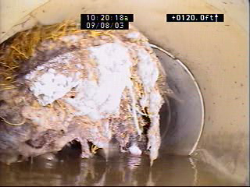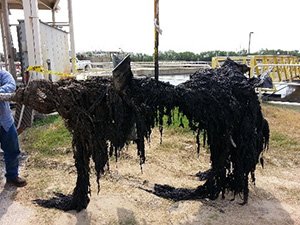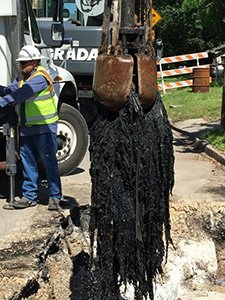Newest Challenges to Our Sewer System - Cleaning & Personal Use Wipes.
They seem relatively harmless – those pre-moistened personal use and cleaning wipes. Yes, they’re handy and convenient, but they also have one other thing in common: After you use them, throw them in the trash can, not the toilet. Why? There are three very simple answers:
- The toilet is not a trash can.
- Only the 3-Ps belong in the toilet; pee, poop and (toilet) paper.
- Throwing things in the toilet other than the 3-Ps can damage the sewer infrastructure and result in a backup into your home or business (yuck).
Misleading Labels

Although the packaging may say flushable, these wipes will not disintegrate like traditional toilet paper in sewer pipes. These wipes clump together with grease, tree roots, or get hooked on deformities in the pipe creating long, mop-like clumps of gunk that form obstructions, clogging sewer pipes and damaging equipment.
Damages Equipment

But really, what’s a few wipes, you say? Can they really add up to big problems? Unfortunately, the answer is yes. If you’ll look closely at the picture on the left, you can see the blades in this piece of equipment are overwhelmed by wipes. And San Antonio is not the only city facing this dirty problem. In fact, it’s a problem at wastewater utilities worldwide. Wipes and grease are wreaking havoc with equipment, causing hours of down time and costing ratepayers big bucks.
The New York Times in early 2015, quoted New York City officials that “The city has spent more than $18 million in the past five years on wipe-related equipment problems.” The Washington Post in a September 2013 article states that Washington Suburban Sanitary Commission “spent more than $1 million to install heavy-duty grinders to shred wipes and other debris before they reach pumps on the way to the treatment plant.” Furthermore, county officials blamed “wipes on a 35 percent jump in broken pumps and clogged sewer lines over several years.”
Local Impact

Locally, wipes are causing problems on several fronts. SAWS team members have to be redirected to remove stoppages caused by wipes and grease; equipment has to be taken out of service or replaced all together impacting plant efficiently; and lift stations must be monitored more frequently to prevent a sanitary sewer overflow from occurring. And speaking of costs, San Antonio recently entered into a consent decree agreement with the Department of Justice and the Environmental Protection Agency to reduce the number of sanitary sewer overflows. The cost to implement this monitoring, repair and replacement program could run into the hundreds of millions of dollars. Proper disposal of all types of wipes and grease will go far in reducing the cost of this multi-year program. Regardless if you live in a multi-family apartment complex or single-family home, disposing of wipes and grease improperly can damage your plumbing, cause a backup in your bathroom and kitchen and cost you lots of time and money.